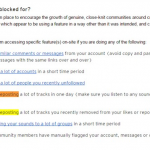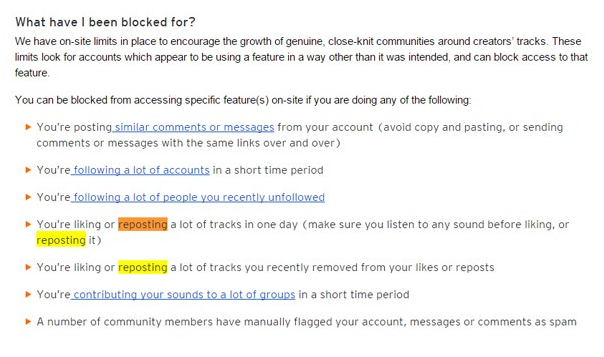Article by Peter Berry
The end of re-reposts on SoundCloud, will your plays dive or thrive?
Three days ago, Soundcloud implemented one of the most prominent programming changes to the platform in its 9 years of operation in removing users’ ability to reshare content twice, or as it is more commonly known in the SoundCloud community, to ‘re-repost’ tracks.
What does this mean? How does this work?
This programming change means that from now on artists, tastemakers and labels who use SoundCloud cannot un-repost content and repost the same track to their followers’ feed as these reshared tracks will not appear. The track will appear on the re-reposting users’ profile for the second time; however, gaining any traction from the action of re-reposting has now become redundant as this re-reposted track will not appear in sharing users’ follower stream.
Why has this change on re-reposts occurred?
SoundCloud has always classed the re-reposting of content on the platform as ‘spam’, previously taking appropriate action to reduce such behavior – most notably in administering repost bans to users (varying from one day to several weeks and even months depending on how frequently the re-reposting of content would occur).
These repost bans became more and more frequent and prominent as artists and labels with limited new tracks each month would only want to share support with other users if the same tracks were to be re-reposted repeatedly. This created a large administrative burden on SoundCloud to answer the increasing subsequent repost ban appeals of users.
With this new programming change, SoundCloud as a music discovery platform essentially wants to bring some sense of organic traction and music discovery back to its users. Removing the ability of users to artificially manipulate their traction simply by re-reposting the same content repeatedly with the same support partners.
Check out SoundCloud’s stance on re-reposts below:
Why has re-reposting become more prominent in the first place?
SoundCloud, unlike Spotify, has not really invested in developing new discovery methods of new music since its inception – keeping its key features much the same. Admittedly, in recent months, newer features have been introduced to address this issue including: user listening history, the ability to filter your liked tracks by genre and the heavier emphasis of the internal SoundCloud charts.
However, as a means of actually getting a track trending, the process has remained the same – heavily relying on a track receiving a large amount of reposts to increase its visibility and organic momentum. For many artists or labels, who have organic followings and fewer releases each month, the best way to maintain consistent traction on weekly basis has been to reshare the same content with the same partners repeatedly. Even if this means ‘breaking’ SoundCloud’s re-repost policies to do so. As result, many artists and tastemakers have received ever-increasing repost bans.
Predictions for the future: more playlists, increasing value of the first repost and the broadening of support partners.
- More playlists – with every so called SoundCloud ‘limitation’, there will always exist someone who will discover a way to surpass it, discovering a new loophole. In the case of SoundCloud making the effectiveness of the re-repost redundant, this loophole has come in the form of a single-track playlist. It can predicted that there will an increasing usage of such playlists to get around this programming change. Allowing artists, labels and certain repost partners to continue sharing the same content with each other each week by simply creating a unique single-track playlist each time they require a re-repost of their track.
- Less spam? With the predicted increasing usage of single-track playlists, the so-called streamlining which SoundCloud hopes to create with its recent programming change in some respects will be largely ineffective. Playlists too have the horrible effect of discontinuing the play stream if listeners are continuously listening to music from the main Soundcloud stream and such playlists do not allow for any kind of, ‘free download’. Therefore, for the effect of creating a more streamlined and efficient platform – this programing change may instead actually have the reversed effect in the long-term for SoundCloud’s users.
- Increasing value of the first repost – this prediction is pretty self-explanatory as the traction of secondary sharing of content from a profile has been eliminated, there will be an increasing emphasis of getting that first repost to really increase a tracks visibility and higher value in that the track cannot be shared again from that profile.
- Broadening of supporting partners – SoundCloud labels, artists and tastemakers will now in some regard be coerced into the search for new repost support partners. Broadening their horizons to make sure they don’t require multiple re-reposts to maintain the traction and visibility of their tracks.
- Reposts lasting longer than 24 hours – users of SoundCloud who would engage in the re-reposting of content each week would normally un-repost content from their profile in order to allow for some period of latency before reposting again (mostly to avoid repost bans). With re-repost becoming ineffective, it is foreseeable that users will keep tracks reposted for longer than the normally assumed period of 24 hours when sharing support.
In conclusion, it can be hoped that some sense of the organic nature of SoundCloud will be returned to the platform with this programming change. Hopefully, this is a continuing pattern of revamping changes SoundCloud is implementing to really modernize the platform with the current streaming market. However, in the light of these changes, you better get used to see seeing a lot more playlists reposted all over your feed.











